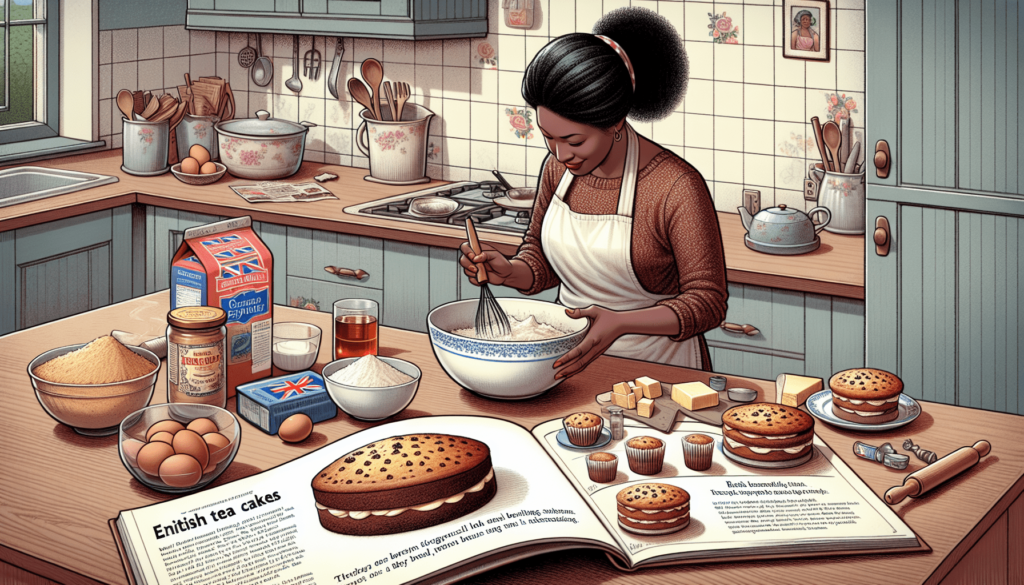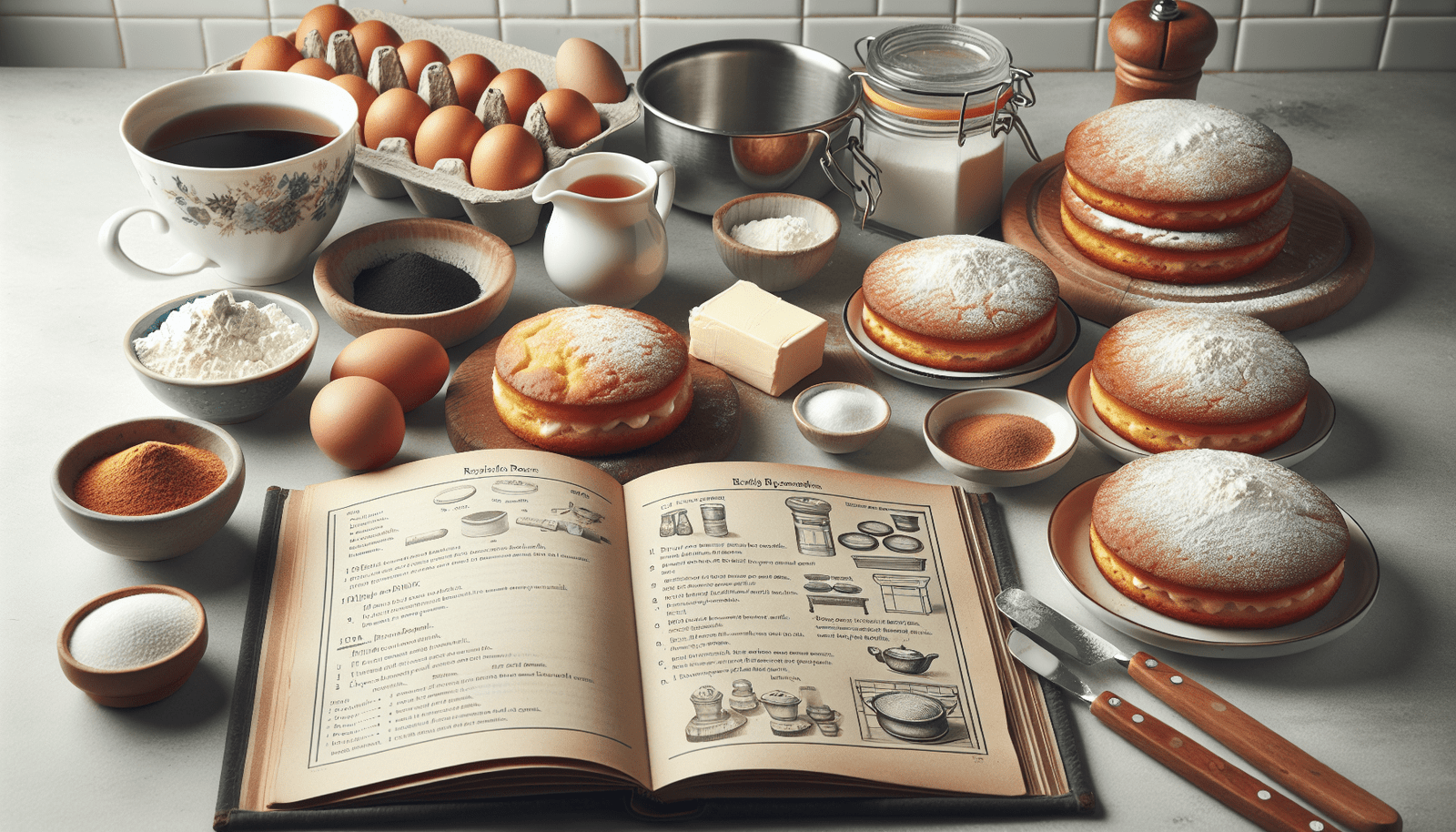Are you ready to embark on a delightful culinary adventure? Look no further than this tantalizing article that will guide you through the intricacies of creating the most scrumptious English Tea Cakes you’ve ever tasted. With their light and fluffy texture, these cakes are the perfect accompaniment to a warm cup of tea. From the melt-in-your-mouth buttery pastry to the delicate sweetness of the currants, every bite will transport you to a quintessential British tea party. Get your apron on and let’s start baking these irresistible treats!
Ingredients
To make delicious English tea cakes, you will need the following ingredients:
All-purpose flour
Start with a solid foundation of all-purpose flour. This versatile ingredient acts as the base for the tea cakes, providing structure and stability.
Baking powder
Baking powder is the secret ingredient that gives the tea cakes their light and fluffy texture. It helps them rise beautifully in the oven, resulting in a delightful treat.
Salt
A pinch of salt is necessary to enhance the flavors in the tea cakes. It balances the sweetness and brings out the other ingredients’ taste.
Unsalted butter
Rich and creamy unsalted butter adds a luscious flavor to the tea cakes. Make sure it is softened at room temperature for easy mixing.
Granulated sugar
Sweetness is key in tea cakes, and granulated sugar fulfills that role perfectly. It adds a delightful sweetness without overpowering the other ingredients.
Eggs
Eggs act as a binding agent in the tea cakes, ensuring all the ingredients come together in a harmonious blend. They also add moisture and richness to the final product.
Milk
Milk adds the necessary liquid to the batter, resulting in a soft and tender texture. Use whole milk for the best results.
Vanilla extract
A splash of vanilla extract enhances the flavor of the tea cakes, giving them a delightful aroma and taste.
Preparation
Preparing the tea cakes involves several steps to ensure a perfect outcome:
Preheat the oven
Begin by preheating your oven to the appropriate temperature specified in the recipe. This ensures that the tea cakes bake evenly and thoroughly.
Grease and flour the baking pans
To prevent the tea cakes from sticking to the baking pans, it is important to grease and flour them. This step ensures easy removal once the cakes are baked.
Mix dry ingredients
In a separate mixing bowl, combine the all-purpose flour, baking powder, and salt. Whisk them together until they are evenly blended.
Cream butter and sugar
In a large mixing bowl, cream together the softened unsalted butter and granulated sugar. Use an electric mixer or a sturdy wooden spoon to create a smooth and creamy texture.
Add eggs and vanilla
Beat the eggs, one at a time, and add them to the butter and sugar mixture. Then, pour in the vanilla extract and mix until everything is well incorporated.
Alternately add dry ingredients and milk
Gradually add the dry ingredient mixture to the butter mixture, alternating with small amounts of milk. This technique ensures a smooth batter and avoids overmixing.
Pour batter into pans
Divide the batter evenly between the greased and floured baking pans. Use a spatula to spread it out and smooth the surface.
Bake in the oven
Place the baking pans in the preheated oven and let the tea cakes bake for the specified time in the recipe. Keep an eye on them to avoid overcooking.
Cool and remove from pans
Once the tea cakes are done baking, allow them to cool in the pans for a few minutes. Then, carefully remove them from the pans and transfer them to a wire rack to cool completely.
Prepare the icing
While the tea cakes are cooling, you can prepare the icing. Choose a frosting that complements the flavor of the tea cakes, such as lemon, chocolate, or vanilla.

Decoration
Now comes the fun part—decorating the tea cakes! Here’s how you can make your cakes look beautiful and appetizing:
Spread icing over the cakes
Take a generous amount of icing and spread it evenly over the surface of the tea cakes. Use a spatula or a butter knife to create a smooth layer.
Add desired decorations
Once the icing is in place, feel free to get creative with your decorations. You can use sprinkles, edible flowers, mini chocolate chips, or any other garnishes that appeal to you.
Variations
English tea cakes offer endless possibilities when it comes to different flavors. Here are some popular variations you can explore:
Lemon Tea Cakes
For a refreshing and citrusy twist, add some lemon zest and a squeeze of fresh lemon juice to the batter. This will infuse the tea cakes with a delightful tangy flavor.
Chocolate Tea Cakes
If you’re a chocolate lover, consider incorporating cocoa powder into the batter. This will result in rich and indulgent tea cakes that are bound to satisfy your cravings.
Fruit Tea Cakes
To add a burst of fruity goodness, incorporate your favorite chopped fruits into the batter. You can try berries, diced apples, or even tropical fruits like mango or pineapple.
Almond Tea Cakes
For a nutty flavor and crunch, add some finely chopped almonds to the batter. You can also use almond extract to intensify the almond flavor further.

Serving Suggestions
To truly enjoy your homemade English tea cakes, here are some delightful serving suggestions:
Serve with a cup of English tea
A classic combination, English tea cakes pair perfectly with a piping hot cup of tea. Whether you prefer black tea, Earl Grey, or herbal infusions, the tea will complement the cakes wonderfully.
Garnish with fresh berries
To add a burst of color and freshness, garnish your tea cakes with a handful of fresh berries. Strawberries, blueberries, and raspberries not only elevate the presentation but also add a delicious fruity component.
Sprinkle with powdered sugar
For an elegant finishing touch, dust the tops of your tea cakes with a light sprinkling of powdered sugar. This simple addition adds a touch of sweetness and beauty to the final presentation.
Tips and Tricks
To ensure your English tea cakes turn out perfectly every time, here are some helpful tips and tricks:
Ensure all ingredients are at room temperature
Having all your ingredients at room temperature promotes better mixing and blending. It results in a smoother batter and a more even distribution of flavors.
Do not overmix the batter
Overmixing the batter can lead to tough and dense tea cakes. Mix just until all the ingredients are incorporated, and stop as soon as you achieve a smooth consistency.
Test doneness with a toothpick
To check if your tea cakes are fully baked, insert a toothpick into the center. If it comes out clean or with only a few crumbs clinging to it, the cakes are ready to be removed from the oven.
Allow cakes to cool completely before icing
Make sure your tea cakes have completely cooled down before applying the icing. Otherwise, the heat may cause the icing to melt, resulting in an uneven and messy appearance.
Storage
If you have any leftovers (which is rare when it comes to these delicious treats), here are some storage tips:
Store in an airtight container
To maintain freshness, place the tea cakes in an airtight container. This will prevent them from drying out and keep them moist for a longer period.
Refrigerate to prolong freshness
If you live in a warm environment or want your tea cakes to last a bit longer, storing them in the refrigerator can help. This will extend their shelf life and keep them fresh.
Can be frozen for future use
If you have a surplus of tea cakes, you can freeze them for later enjoyment. Wrap each cake individually in plastic wrap or place them in a freezer-safe container. They can be stored in the freezer for up to three months.
History of English Tea Cakes
English tea cakes have a rich and storied history. Here are some key points about their origins:
Originated in England
As the name suggests, English tea cakes originated in England. They have been a beloved treat in British culture for centuries.
Traditionally served during afternoon tea
English tea cakes became particularly popular during the tradition of afternoon tea. They were the perfect accompaniment to a leisurely and luxurious tea time.
Evolved from traditional tea biscuits
The concept of tea cakes evolved from traditional tea biscuits. While tea biscuits were plain and typically served alongside tea, tea cakes added flavors, sweetness, and decoration.
Tea Cakes vs. Cakes
English tea cakes and regular cakes have some distinct differences. Here’s how they compare:
Tea cakes are smaller in size
Unlike regular cakes, tea cakes are smaller in size. They are often made in individual portions, allowing for easy serving and consumption during tea time.
Often served without frosting
While regular cakes are commonly adorned with decadent frosting, tea cakes are often served without frosting. This allows the simplicity and delicate flavors of the cake to shine through.
Lighter and less sweet compared to regular cakes
Tea cakes tend to be lighter in texture and less sweet compared to regular cakes. They offer a more delicate and refined taste experience, perfect for accompanying a cup of tea.
Popular Tea Cake Flavors
English tea cakes come in a variety of flavors, catering to different tastes and preferences. Here are some popular tea cake flavors to try:
Earl Grey
Infused with the distinct flavor of Earl Grey tea, these tea cakes offer a unique and aromatic experience. The hint of bergamot in the tea adds a delightful twist to the traditional tea cake.
Lavender
Lavender adds a floral essence to tea cakes, creating a refreshing and fragrant treat. These cakes are perfect for those looking for a more delicate and sophisticated flavor.
Orange
Orange tea cakes feature the zesty and vibrant flavors of oranges. They bring a burst of citrus goodness to the table, making them a hit at any tea party or gathering.
Rose
Rose-infused tea cakes offer a romantic and whimsical touch to your tea time. The subtle floral notes create an exquisite flavor, leaving you feeling transported to a beautiful rose garden.
With this comprehensive recipe, tips, and variations, you’re well-equipped to embark on your English tea cake baking adventure. Enjoy these delightful treats and savor the tradition and taste they bring to your tea time gatherings.


